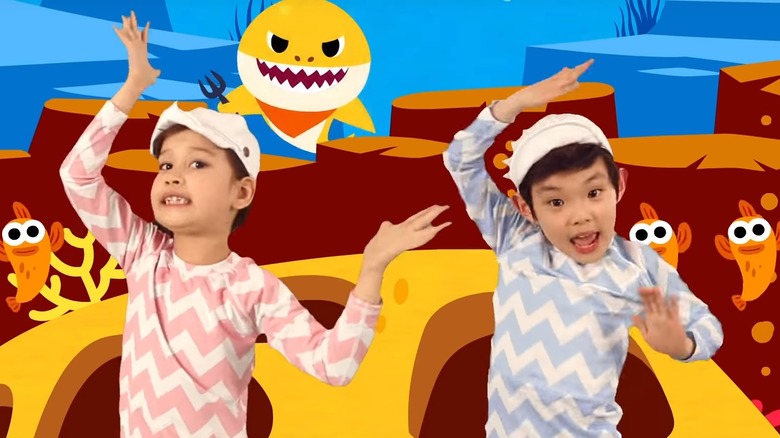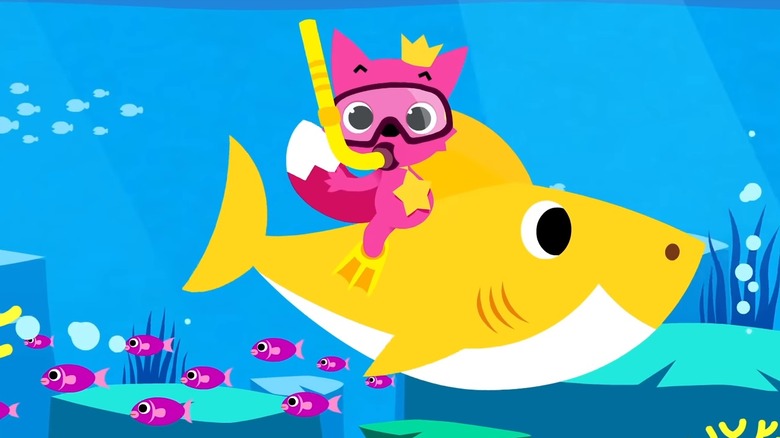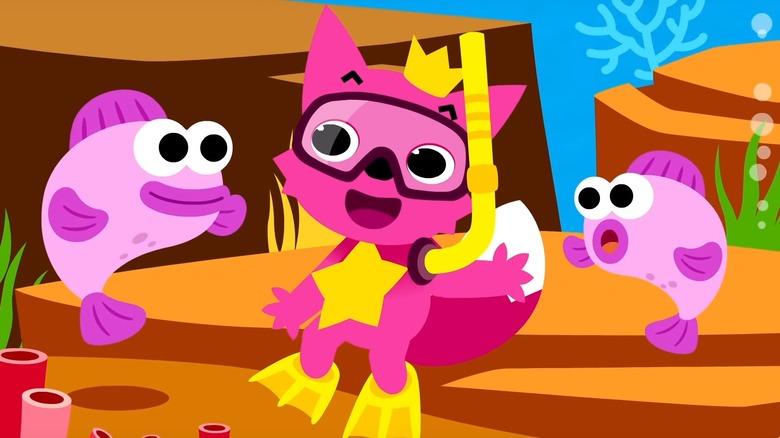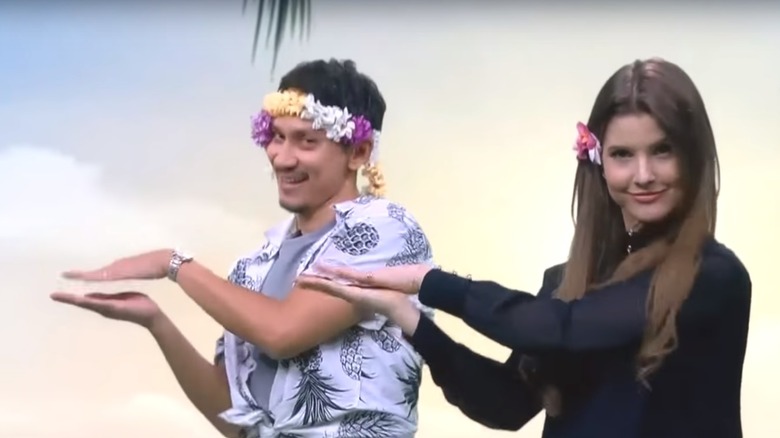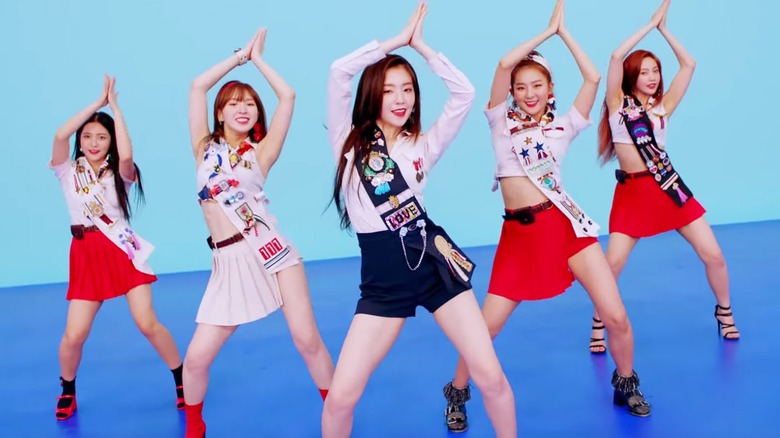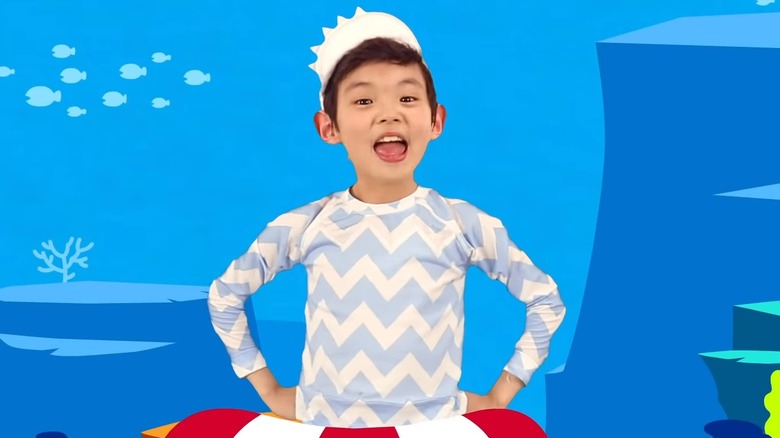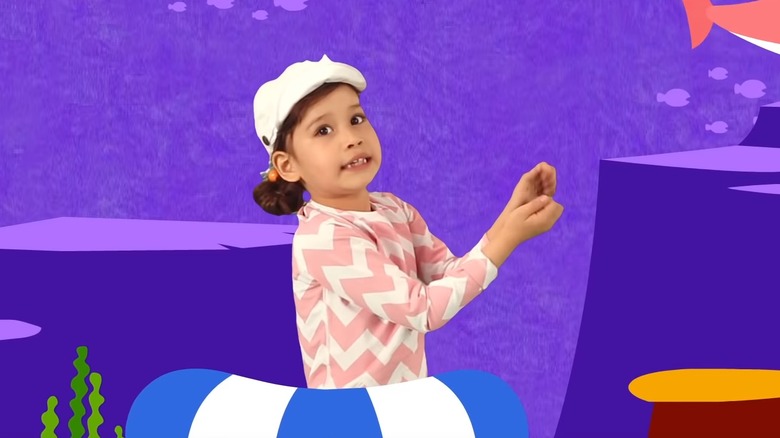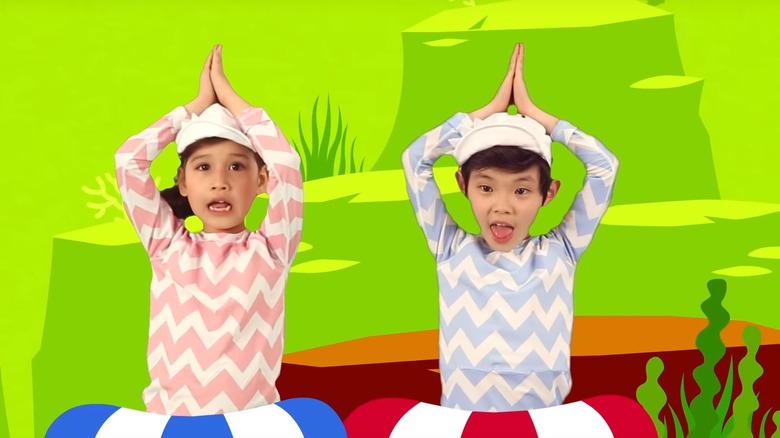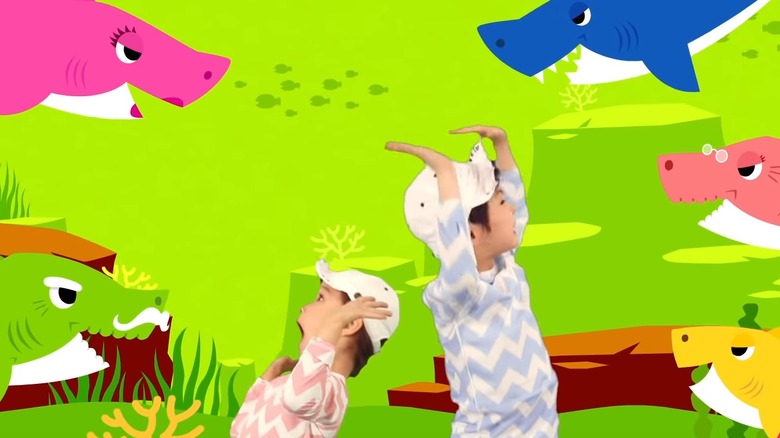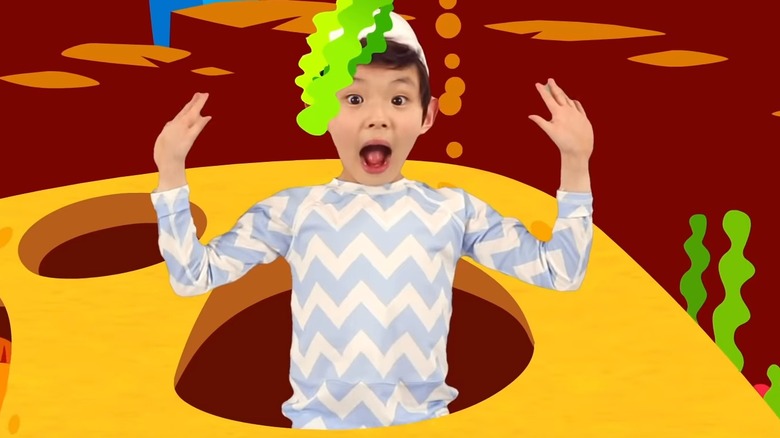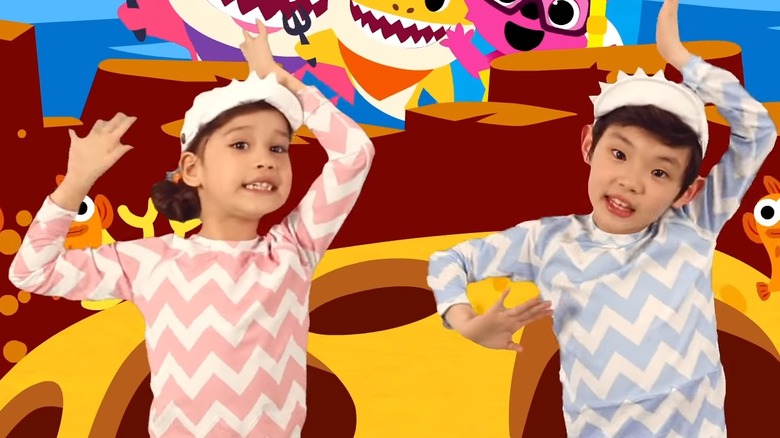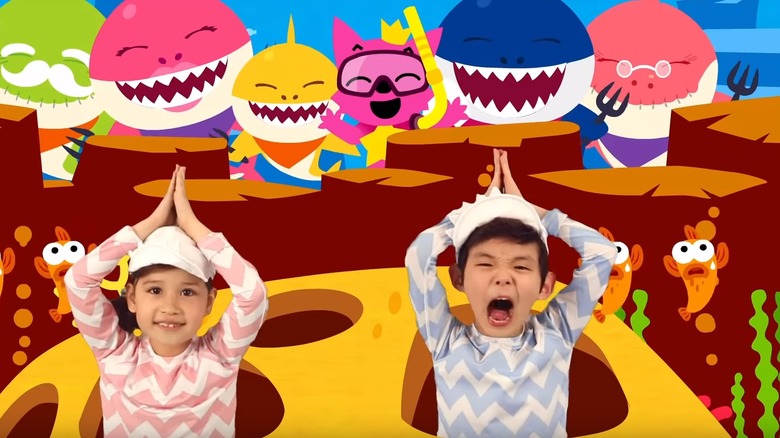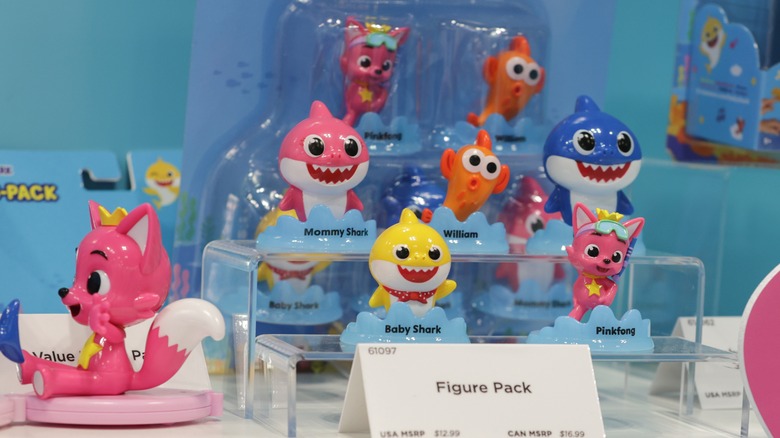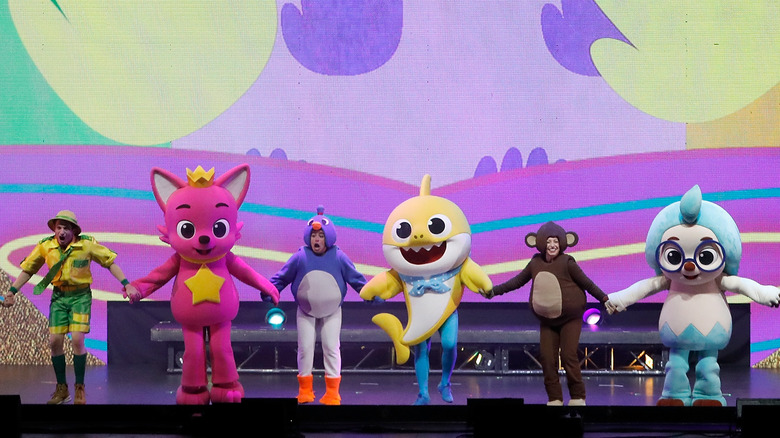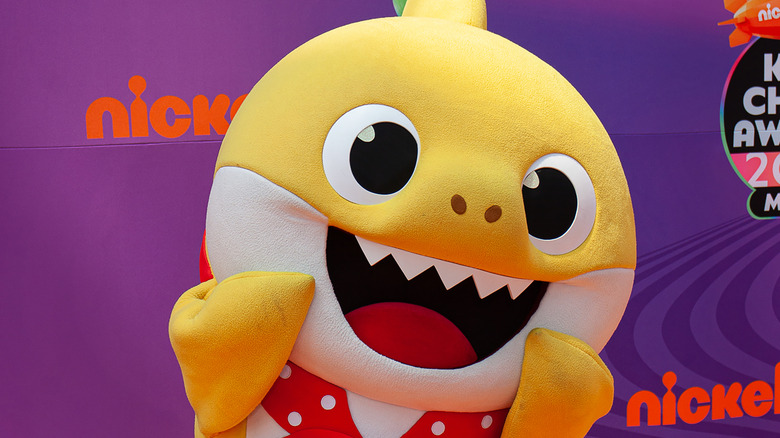The Untold Truth Of Baby Shark
We may receive a commission on purchases made from links.
Baby shark, doo-doo doo-doo doo-doo!
If you haven't heard the viral song that's broken the internet, you're missing out on a true cultural phenomenon. And if you have heard it, it's likely already playing on a repeat loop either in your head or in your house right now. In any case, the song is seemingly everywhere, entertaining both kids and adults alike with its ear-wormy goodness.
But there's definitely more than meets the eye to one of the catchiest tunes ever to grace your YouTube feed. So where did it come from? Was it the brainchild of a mad genius or a fancy corporate executive? Is there a specific formula that the composers followed to deliberately torment parents around the world? Now that the song has cemented itself as the most-watched YouTube video of all time (and the other contenders would need to score a few billion more views to catch up), it's time to explore the origin story of "Baby Shark."
It's produced by a Korean company
"Baby Shark" didn't manifest out of nothingness and descend to earth out of the aether, nor did it beach itself on land after emerging from a churning sea. Rather, it's simply one of many, many songs and videos produced by a Korean company by the name of SmartStudy, under its Pinkfong brand. According to an article from CNN, Pinkfong produces a "metric ton" of streaming content for children, featuring carefully-produced, vividly-colored videos. Its YouTube channel has a whopping 69+ million subscribers, and nearly 40 billion (yes billion!) total views — clearly they know what they're doing!
In the midst of all of these videos, offered in multiple languages, is the dance-inducing "Baby Shark," which Pinkfong posted in 2016. Inspired by K-Pop beats, the song is now a household staple for kids (and those of us who are kids at heart) around the world.
They had no idea it would go viral
Pinkfong's U.S. CEO Bin Jeong had a feeling that "Baby Shark" would do well and become popular with children, as did everyone at the company — that was evident right away. "We instantly saw that Baby Shark starting performing, even compared to our other best-performing videos on the channel," she recalled in an interview with CNN. "We saw it was going to be special."
But just as is the case with most things that go mega-viral, they didn't know just how popular it would become — that seemed to come from somewhere else. "We put more marketing behind it, but that's not how or why it became so viral," she continued. "To be honest, no matter what you do, the ones that make it, make it on their own." Fast-forward, and the toddler anthem has racked up over 2.2 billion views on YouTube with no signs of slowing down. Who could have guessed?
The popularity started in Indonesia
Part of the reason "Baby Shark" started raking in the views is because of a social media trend that swept Indonesia in 2017: the #BabySharkChallenge. According to an article in NextShark, a whole bunch of people, from ordinary folks to law enforcement officials and even a western celeb, got doo-doo down to the catchy pop jingle.
One face that will be familiar to American audiences is actress and social media influencer Amanda Cerny, who did the challenge on Indonesia's Tonight Show — along with a handsome duo of floral-adorned backup dancers. Their facial expressions are gold.
Some uniformed personnel also got in on the challenge, with some surprisingly elegant arm choreography and execution. And if you really want to go down the rabbit hole, check out this compilation of the #BabySharkChallenge, with everyone from bankers to schoolgirls bringing their A-game.
K-Pop celebs gave it a big boost
Just as "Baby Shark" spread like wildfire throughout Indonesia and South Asia, it also became extremely popular at home in South Korea. And according to Forbes magazine, SmartStudy execs say that the song got lots of attention thanks to the help of several K-Pop groups (like Girls' Generation and Red Velvet) that participated in the #BabySharkChallenge. You can't ask for better marketing than that!
Thanks to those K-Pop superstars, "Baby Shark" swam further into the marketplace, rendering the vast majority of listeners internationally. "85% of our 'Baby Shark' song's 800 million views come from international markets already, and it keeps increasing," Jamie Oh, the company's director of marketing communications in September of 2017, shared with Forbes. Since then, the song has only gotten more viral around the world.
Other K-Pop stars who accepted the challenge include Monsta X, BTS, GOT7, Mamamoo, and a whole lot more.
It broke into the Billboard Top 100
It seems that no country is safe from "Baby Shark," and that includes the United States, where the song gained popularity (and notoriety) thanks to social media. Additionally, some high-profile celebs like Ellen DeGeneres and James Corden hopped on the "Baby Shark" train, showing just how widespread the ditty has become in America.
After that, in what now just seems inevitable, the song broke into the Billboard Top 100 at number 32 in early 2019, after penetrating the UK Top 40 and Billboard's Kid Digital Song Sales chart in 2018. But that doesn't mean SmartStudy's Pinkfong is going to rest on their laurels. "We are not planning to settle for Baby Shark hitting the music charts and getting YouTube views," Jeong revealed to The New York Times. "We are developing Pinkfong and Baby Shark into an entertainment brand that will be enjoyed by generations to come." Who knows what else the company has up its sleeve?
It's bringing home the bacon
Anyone can stream "Baby Shark" on YouTube for free from their phone or computer, but that doesn't mean SmartStudy's Pinkfong isn't seeing any green — far from it! In fact, in 2018, their revenue was 37 billion won, up from 27.2 billion won previously, according to The Straits Times — thanks to "Baby Shark". Additionally, their net income likely more than doubled itself to about 5 billion won. That is not chump change!
So where's the money coming from? Approximately 70% of SmartStudy's revenue comes from digital sales, such as in-app purchases. The remainder comes from physical sales, such as merchandise. And as for the future? The company is planning to release short videos on Netflix, including a cartoon series and a musical in North America. Furthermore, they may work with Amazon and Google to develop games.
There's a reason kids watch the video repeatedly
There's no shortage of songs and videos out there to entertain your wee ones these days thanks to the many streaming platforms available to consumers. So what is it about "Baby Shark" that kids love so much, and why do they want to hear the song over and over again?
As it turns out, the tune follows a formula that endears it especially to children. For one, it's repetitive, according to The Daily Beast. "The song has a simple melody that is not only 'catchy,' but is also easy to sing and memorize," said Beatriz Ilari, a professor at USC's Thornton School of Music. Plus it's memorable, which can help elicit a pleasurable response, and upbeat, which makes the littles want to dance. Top it off with the fact that the lyrics are about animals and family — both of which kids are familiar with — and you have a recipe for a viral hit. The video helps too, as it provides a visual stimulus for an immersive experience.
They tried not to make it annoying
If you're the parent of a toddler who's become obsessed with "Baby Shark," chances are you've heard the song a few million times by now. And while we're tempted to send our condolences, the reality is that you could do much worse. That's because the execs at SmartStudy's Pinkfong really did try not to make it super annoying. "When our content creators create songs, they know the pain of watching it over and over again," Jeong shared in an interview with CNN. "They are moms, so they wanted to really create something that can be enjoyed by the entire family."
Parenting coach Susan Morley agrees, pointing out that songs like this prepare children for language. "They're fun and they create a world-to-lyric connection, where kids can recognize real-life themes like family," she explained. And it's certainly better than, say, "Barney & Friends." "Even parents who hate 'Baby Shark,' hate it less than they hated Barney," she added. Fair enough!
It's not as new as you think
You might think that "Baby Shark" is a new phenomenon, perhaps written by the creatives at SmartStudy's Pinkfong. But the song has actually been around quite a long time, certainly before it showed up on their content channel. Most notably, it was a staple at summer camps and scouting retreats, according to Vox. So some folks might remember it from their own childhoods. Cue the nostalgia!
In addition to being a ubiquitous sing-along-song, "Baby Shark" has shown up before on YouTube as well. The agreed-upon seminal version of the song became famous in 2007 by a German woman by the name of Alexandra Müller, AKA Alemuel, making her the de facto O.G. of the ditty. It went viral back then in Germany, foreshadowing the overwhelming success of the Pinkfong version.
Another version of "Baby Shark" popped up on YouTube in 2012 as well, though it lacks the bright colors and slick formatting of the more recent viral sensation.
Remixing a classic
SmartStudy's Pinkfong might not have written or composed "Baby Shark," but they certainly knew exactly how to polish it to make it have widespread appeal among a modern audience. "We took a fresh twist and re-created on a traditional singalong chant with our Pinkfong's Baby Shark," Jamie Oh recalled in an interview with Quartz. That's where the catchy K-Pop beats come into play, as you can't help but want to dance when you hear it!
You might also have questions about the intro to the song, which sounds a lot like the super famous "Jaws" theme song. But believe it or not, what you hear is an entirely different song from an entirely different composer. "In addition to the upbeat rhythms and fresh melody, Dvorak's New World Symphony has been added to the beginning of the song to emphasize the tension before the shark family shows up," Oh continued. There you have it, a recipe for success.
It used to be grislier
It's quite obvious that "Baby Shark" in this iteration is unquestionably wholesome. In the end, everyone ends up safe, and no one — neither shark nor human — is maimed or killed for the duration of the song.
But interestingly enough, some of the previous versions of the song have been decidedly less toddler-friendly, according to The Washington Post. In the article, several parents recall versions where a panicked surfer is devoured by a shark limb by limb, which is significantly more graphic than SmartStudy's Pinkfong version.
Other iterations, such as this rendition performed in 2017, feature not just losing limbs and dying, but also receiving CPR unsuccessfully and ascending to heaven. And of course, the accompanying choreography is pretty graphic — how else can you pantomime losing limbs and being eaten alive? For sure, that's not exactly comforting subject matter for babies and toddlers.
There were times when Baby Shark got sinister
With the power to make you dance — or exit the room in a hurry — in just under two minutes, polarization is the soul of "Baby Shark." Like many other pop cultural phenomena, the masses remain divided on whether the song is an international treasure or a scourge on humanity. But in addition to its controversial nature, you might be surprised to learn that this unassuming little ditty has been taken to some pretty sinister places.
In 2023, "Baby Shark" landed in hot water — hot bath water, to be exact — over plastic bath toys that injured at least 12 children. The culprits were Baby Shark Sing & Swim Bath Toys. Despite their harmless appearance, the plastic shark-shaped toys had deceptively hazardous dorsal fins, which caused "multiple impalements, lacerations, and puncture wounds," according to the Independent. Thankfully, no children were seriously injured by the toys — but they did prove to be dangerously sharp, doo-doo doo-doo doo-doo. A recall was issued in response, and 7.5 million of the perilous playthings were pulled from store shelves.
In 2020, two Oklahoma corrections officers were charged with using "Baby Shark" as a torture tactic against incarcerated people (via The Oklahoman). According to court filings, Christian Charles Miles and Gregory Cornell Butler Jr. forced several inmates to listen to the song repeatedly at ear-splitting volumes while restrained in a standing position. Miles and Butler were convicted of misdemeanor cruelty to a prisoner in 2023 according to NBC News.
Baby Shark is taking the entertainment industry by storm
Like it or not, "Baby Shark" is the most ubiquitous song on the internet; the tune's popularity continues to soar, to the delight of some and the chagrin of others. Naturally, success has paved the way for "Baby Shark" to spread its fins into new (and more lucrative) territory, including live shows. "Baby Shark Live!" first hit arenas in 2019. Described in Parents magazine as "basically a rave for kids," the upbeat, toddler-friendly spectacle sold out dozens of North American cities. According to Pinkfong CEO Kim Min-seok, "Baby Shark Live!" was an effort to revolutionize the brand. "Live shows are one of the most engaging ways to foster fans' loyalty," Kim explained to Forbes. "Providing a space where kids and families can sing and dance together, live shows offer unique entertainment experiences with different levels of engagement compared to the experiences from TV shows and videos."
In 2020, the franchise sunk its teeth into television when "Baby Shark's Big Show!" premiered on Nickelodeon. Following its small-screen success, a feature film was inevitable. "Baby Shark's Big Movie!" is set to be the latest installment of the "Baby Shark" craze. The film will debut on Paramout+ and features a star-studded cast, including Cardi B, Lance Bass, Ego Nwodim, and Ashley Tisdale. Tisdale shared the news in a 2023 Instagram reel, writing, "I'm so excited to voice this glamorous villain in 'Baby Shark's Big Movie!'"
Baby Shark's creator has big plans for the brand
With an all-out viral sensation on their hands, it's no surprise that "Baby Shark" creator Pinkfong is poised to ride the wave of "Baby Shark" mania. In 2023, Pinkfong CEO Kim Min-seok revealed that the company has big plans for the future — and their vision includes all generations, not just small children. "We've initiated a new growth plan to expand into a global content powerhouse that creates content and entertaining experiences for family members of all ages," Kim told Forbes. Part of that plan includes short-form, mobile-friendly comic book stories called Webtoons. Kim believes that Webtoons, which have already taken off in Korea, are the future of entertainment. "TikTok content is 30 seconds or 10 seconds — very short — generally with no context," the executive explained. "Webtoons are similar in that you don't need to remember the whole storyline."
Kim also divulged that a "Baby Shark" theme park could soon be in the works. Pinkfong has already tested the market by opening pop-up theme parks in Singapore and Malaysia. Thanks to the success of these pop-up ventures, there's an increased chance that "Baby Shark" could indeed breach the market with a full-scale theme park. "Theme parks not only feature highly engaging attractions and experiences such as rides, games, and merchandise but also provide kids and their parents with opportunities to spend quality time together," Kim remarked.
